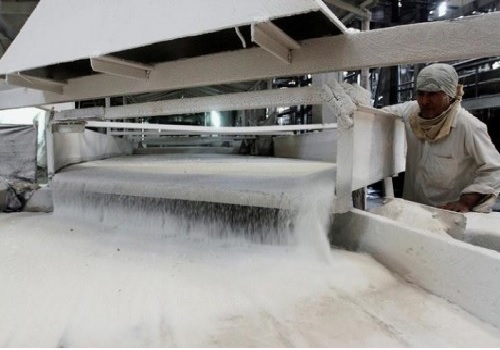Quality First: The Road Ahead for the Indian Spices Industry By Ritwik Bahuguna, Director of Farlense Group & Founder- Roots Foundation & Prashasti Yadav, Manager Communications, Farlense Group

Recently, established Indian spices brands MDH and Everest found themselves in the eye of an international storm as authorities in the US, Hong Kong, and Singapore raised red flags over the quality of their products. Both brands have vehemently denied any wrongdoing and have reassured consumers of their commitment to stringent health and safety standards, both domestically and internationally.
The controversy stems from a series of findings indicating discrepancies in the standards of these spices giants, prompting a closer examination of the Indian spices industry's practices at large. According to an article by NDTV, an extensive analysis of over 1.23 lakh food samples conducted between 2023 and 2024 revealed alarming results. Out of these samples, a staggering 24,794 failed to meet the required standards set by FSSAI. Among the samples scrutinized were 38,661 spice samples, the brands of which were undisclosed.
At the heart of this controversy lies the use of ethylene oxide, a chemical banned by European authorities due to its carcinogenic properties. Ethylene oxide is used as a fumigant in the sterilization process of various foods, including spices. Despite its ban in many regions, the US Environmental Protection Agency (EPA) has set tolerances for ethylene oxide residues in various food items, indicating its potential presence in imported products. For example, 7 ppm on herbs and spices, liquorice roots, dried peppermint tops, sesame seeds, dried spearmint tops, and dried vegetables.
The controversy underscores a broader issue within the spice industry - the need for stringent regulations and quality control measures. The lax oversight of farming practices, including the indiscriminate use of pesticides by farmers desperate for crop growth, poses a significant risk to consumer health. Additionally, the reliance on carcinogenic chemicals like ethylene oxide for spice sterilization further compounds these risks.
Given these advancements, one of our investee companies Azad Agro, sets a precedent for responsible and ethical practices in the spice trade, by directly sourcing agricultural produce from registered farmers and prioritizing education and empowerment at the grassroots level.
Azad Agro’s (AA) Holistic Approach – A Successful Case Study
Azad Agro, based out of Kota in Rajasthan, is a leader in supplying IPM coriander and cumin to various brands and B2B buyers. Its team of experts has complete control over the entire value chain of these spices with SOPs based on the following principles –
1. Development of an internationally acceptable package of practices (regularly updated).
2. Education of registered farmers on best practices in crop cultivation.
3. Complete handholding, training, and supervision of farmers during the entire cropping cycle, including testing for banned molecules.
4. Development of requisite infrastructure for procurement, logistics, processing & packaging, including steam sterilization, a more natural way of processing that aligns with international regulatory standards and ensures minimal distortion in taste as far as consumption is concerned.
5. Strong forward linkages, primarily catering to MNCs.
6. Appropriate use of technology in the entire chain (Source Trace App etc.)
The stickiness created by this model ensures that 5,000+ farmers (and the number is growing every year) don’t just supply to AA but are an intrinsic part of the AA family. AA not only ensures better incomes for member farmers but also promotes sustainable agriculture practices and ensures holistic development of their families through a range of education, healthcare, and sports with its partner, Roots Foundation.
The Way Ahead
It should not come as a surprise if the quality of ingredients (resulting end products) for most spices brands being sold in India is found wanting (read inferior) by regulatory authorities. A constant struggle to retain or increase margins in a very price-sensitive market is a major reason for this phenomenon. Many spice brands are mere marketing agencies that have made hardly any investment in forging quality backward linkages and quality processing infrastructure.
As the next step, the food regulator must test the products of all major brands selling in India and come out with the results in public. At another level, the food regulator must also benchmark the parameters it has laid down for Indian brands against those set by their counterparts in developed countries. Government and consumer pressure will force brands to rethink their business models. In parallel, brands must invest in farmers to improve the POPs and technical know-how. Quality raw material is the first step in the supply chain. They must also invest in quality processing and packaging infrastructure. Ample central and provincial government funds are available as incentives for infrastructure creation in food processing. There is a global phenomenon of more aware consumers demanding better quality products, more accurate labeling, and environment-friendly packaging. The Indian spices industry has no option but to fall in line and follow ethical and sustainable practices to manufacture quality products. Our investee company Azad Agro’s success shows that profitability and quality can go hand in hand.


ROOTS FOUNDATION AGRICULTURE PROJECTS
ROOTS FOUNDATION’s core work is with the agriculture communities in villages spanning across 15+ Indian states. ROOTS has worked intensively with these communities to train them in latest and innovative farming techniques leading to yield maximization and resource conservation. The Foundation has its organization embedded with the farming communities to enable them to make a sustainable living through holistic community development programs focused around agriculture, education, skilling, healthcare, nutrition and sports.
Agriculture and allied sectors still form the backbone of the Indian economy and employ more than half of the country’s population. At Roots, we realize the impact this sector has on the livelihoods of hundreds of millions of people living in rural India. Our programs help farmers reduce production cost, increase output and sell produce directly to retailers or processors. Our programs can be broadly classified under the following heads:

Natural Resource Conservation Program (NRCP)
Under our NRCP program, we have trained more than 10,00,000 farmers across India in the Direct Seeded Rice (DSR) technique. DSR enables farmers to reduce production cost and water usage drastically.
Agriculture Productivity Enhancement Program (APEP)
In APEP, we train farmers in good agricultural practices and latest available technologies so as to ensure better yield. We have trained more than 10,000 farmers across multiple states under this program.
Farm Produce Market Linkage Program (FPMLP)
In the FPML program, we adopt a market-based approach. We take the requirements and specifications from food processing companies and then, go backwards and train farmers to produce ‘exactly’ what is required by the food processors. More than 6,000 farmers have been linked to markets under this program.
Technology Transfer Program (TTP)
TTP, our latest program, handpicks from existing technologies and applications available in the market and pilots these technologies with our farming communities to see their overall impact and acceptability before a scaling up plan is formulated. Some of the solutions we have piloted include: dedicated set top boxes, mobile apps for farm management, mobile apps for weed identification, soil health practices, etc. Our pilot programs have thus far reached more than 10,000 farmers pan-India.
PROJECTS
1- Establishing Farmer Field Schools (Demonstrations of Integrated Farming) with a Focus on Product Stewardship and Water Conservation
Primary focus under the project ‘Holistic Rural Development’ has been to infuse sustainable and advanced practices in the agriculture to reduce drudgery and thereby improve livelihood options for the families. Farmer Field School (FFS) is non-formal, on the spot practical activity to demonstrate the principles and activities undertaken on Sustainable Agriculture Practices. This is suitable for even the verbal literate farming community and empowers farmers to solve their field problem through participation, interaction and demonstration. Under this demonstration activity, farmers develop themselves to tailor Integrated Pest Management (IPM), Integrated Soil Nutrient Management, multi-layer farming and maximize productivity from a piece of land.

2-Build a Sustainable Ecosystem of Rural Entrepreneurs in Farm Mechanization As A Service and Awareness Advocacy on the Safe Usage of Agro-Chemical Application
The program aims to make farmers aware and trained in the new technologies, build 100 entrepreneurs amongst farmers by providing them training and giving them an opportunity to lease out the equipment and transfer knowledge to other farmers. Advocacy and awareness amongst farmers on benefits of proper application of agro chemicals is a crucial part of the program. This will result in overall behavioral change in farmers benefitting them in terms of health, income opportunities and also improving the quality of soil and environment.
3-Increasing cotton productivity by providing eco-friendly PWB management technology to cotton farmers
Pink bollworm is one of the major pests of cotton in India. Cotton growers from across the country have incurred huge losses due to PBW infestation. PB Knot os new and eco-friendly technology which provides opportunity for better management of PBW in Cotton. Single application in season manages the pink bollworm till 90 days. The program initiated the control measures at community level and created awareness on improved farm practices amongst cotton farmers through field demonstrations and field days.

4-Crop Residue Management: Punjab and Haryana
Prevent crop residue burning and manage stubble disposal through alternate in-situ and ex-situ methods such as Happy seeder/Super seeder, Pusa decomposer or Baler machine. The initiative promoted indigenous method of crop residue management using modern and superior techniques. The great program included live demonstrations in the four districts of the two states most impacted by the pollution crisis. Farmers of approximately 80 villages welcomed the program by accepting and adopting these alternative practices, reducing GHG emissions and improving the quality of air in the target areas.

5-Training of Farmers on chili cultivation for livelihood enhancement through identifying the Pests, Diseases, and yield loss
The project was undertaken in two states covering different agro-climatic zones – Madhya Pradesh and Andhra Pradesh. The objectives of this project are to enhance farmers livelihood through increased yield in chilli and to mobilize farmers and generate awareness on improved farm practices in chilli farming through field demonstration and field days. Roots foundation provided hands on training on different aspects such as, herbicide application technology, insect pest and diseases management etc.

6-Technological Innovations in Sustainable Agriculture: Rice Production with Conservation of Natural Resources: Direct Seeded Rice Technique
Problem: Traditionally, rice cultivation is practiced through hand transplanting in a puddled field. It takes 3000-4000 litres of water to produce 1 kg of rice. This is an expensive method in terms of time, labour costs, water usage, and fuel energy. This has led to excessive pumping of groundwater – to meet the water needs of transplanted paddy – leading to decline of groundwater resulting in a scarcity and higher cost of pumping water.
Solution: Direct-Seeded Rice (DSR) technique, an established alternative technology eliminates the entire cost for raising nursery and transplanting and can produce similar grain yields as the traditional practice with higher net profits. DSR is the practice of establishing a rice crop from seeds sown directly in the main field instead of transplanting seedlings from the nursery to the main field.
Roots Foundation has been at the forefront of promoting climate smart agricultural practices PAN India (more than 10 states) by training farmers in the Direct Seeded Rice technique.

7-Increasing Agricultural Productivity and Incomes for Small and Marginal Farmers through Skill Development Initiatives (focus crop: Banana)
Through this project, we enhanced agricultural productivity and increase in income for banana farmers through skill development initiatives in Tamil Nadu. The project benefitted all categories of farmers (especially the small and marginal ones) who face various constraints and multiple challenges pertaining to banana production and marketing. We imparted latest technical skills and better market access for banana and its bi-products.

8-Afforestation: Ecological restoration of land
The Project aimed at transforming the degraded land in Maharashtra and Madhya Pradesh into a Small Forest Patch for improving the biodiversity and soil in the coming years through Miyawaki, Dense & Cluster Afforestation. Roots Foundation coordinated with the local communities to sensitize them on importance of trees and their role in the preservation of forest for their well-being. Healthy Native Species of plants were chosen after tests of soil & soil bed to ensure that they can survive well in the region. Technical experts were consulted for soil nourishment and enrichment to ensure trees get the required nutrition. Dedicated manpower takes care of the forest for a decided period by watering, mulching, de-weeding, manuring, etc.

Above views are of the author and not of the website kindly read disclaimer
























